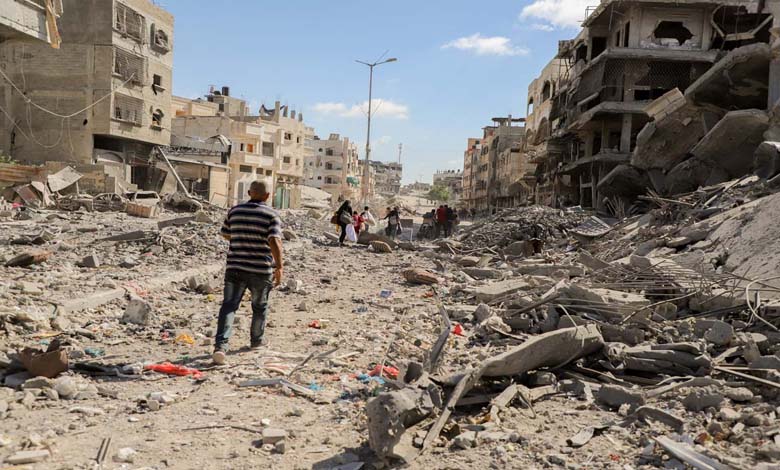Two years into the Gaza war, Israel has gone from international sympathy to global isolation

At the start of its military campaign, Israel enjoyed broad Western support. But two years later, it finds itself isolated, even ostracized. The country initially managed to capitalize on Hamas’s surprise attack against Israeli military bases and border towns around Gaza.
-
Gaza on the fire of waiting… Is a “crescent” of truce appearing on the horizon?
-
Trump’s Deadline for Hamas Nears Its End… Gaza’s Displaced Caught Between Hardship and the Inability to Escape
In the first days of the war, famous landmarks around the world were lit up in blue and white in a show of solidarity. The attack was described as the deadliest in Israel’s history, seemingly justifying its military response in the eyes of many governments.
Over time, however, this support eroded. As the months went by, global opinion shifted: what was once seen as “self-defense” came to be viewed as collective punishment. The images of relentless bombings, tens of thousands of civilian deaths — mostly women and children — and widespread destruction completely changed the narrative.
-
Gaza Developments: Israel Shuts Down the Last Passage from South to North
-
Displaced in a cemetery: Gaza’s living seek refuge among the dead
Social media platforms became flooded with videos of dead children, families crushed under rubble, and people starving. These images, broadcast to billions of smartphones worldwide, sparked unprecedented outrage.
Israel tried to deflect accusations by claiming it warned civilians before airstrikes and denying reports of famine — despite overwhelming evidence from the UN and humanitarian organizations to the contrary.
Videos filmed by Israeli soldiers inside Gaza further damaged the country’s image. Many clips showed troops boasting about destroying entire neighborhoods, sometimes in memory of fallen comrades or even to celebrate birthdays.
-
Refusal to Apologize for the Cost of War: Senior Hamas Official Distances Himself from Gaza Civilians’ Suffering
-
With the death of an officer in Gaza, Israeli losses approach the one-thousand mark
The world could no longer look away. Millions of people took to the streets — from New York and Paris to London, Rome, Barcelona, Johannesburg, São Paulo, and Sydney — demanding an immediate end to the war.
Statements by Israeli opposition leaders accusing Prime Minister Benjamin Netanyahu of prolonging the conflict for political survival intensified the backlash. Meanwhile, extremist ministers such as Itamar Ben-Gvir and Bezalel Smotrich openly called for the reoccupation of Gaza, the rebuilding of settlements, and the expulsion of its inhabitants.
-
Day of Triple Recognition: Palestine Born from Gaza’s Suffering
-
Behind Every Number, a Tragedy… 11 Displacements into the Unknown Amid Gaza’s Ruins
Phrases like “there are no innocents in Gaza,” “drop the nuclear bomb,” and “wipe them all out” triggered a decisive global shift — first among civil societies, then within governments. The world realized the war was no longer about the October 7 attack but about punishing an entire population.
The protests led by families of Israeli hostages every Saturday night calling for an end to the fighting amplified both domestic and international pressure.
Inside Israel, the media avoided showing the human cost in Gaza, focusing instead on images of airstrikes and collapsing buildings.
-
Hours before the bombing: a mission to rescue 2,000 years of memory in Gaza
-
From Death to Death: Stories of Escape from the Hell of Gaza
Across five continents, mass protests condemned the ongoing war. From elite universities in the United States to streets in Europe, Africa, Asia, and Latin America, Israel faced growing global condemnation.
According to a survey by the Israel Democracy Institute, 73% of Israelis believe their country’s international standing has worsened since October 2023, and 66% think it’s time to end the Gaza war.
Haaretz reported that Israel is “gradually losing its legitimacy worldwide,” now grouped with other pariah nations. Sanctions, travel bans, port worker boycotts, disinvestment from Israeli companies, and even retail chains refusing Israeli products illustrate this trend. The once-thriving tech sector is also feeling the pressure, with many startups considering relocation abroad.
-
Conflicting reports on an Israeli ground incursion in Gaza as nearly half the city’s residents flee
-
Palestinian political analyst: despite their importance, aid convoys are not enough to meet Gaza’s needs
Israelis now face growing hostility when traveling overseas. “The world,” Haaretz wrote, “is making Israel pay for its actions in Gaza. If it continues on this path, it may not withstand its isolation.”
Columnist Ben-Dror Yemini wrote in Yedioth Ahronoth: “From a broader perspective, Israel has come close to collapse — not militarily, but politically and strategically. Hamas succeeded in dragging Israel into self-destruction.”
-
Latest News from Gaza: Towers Collapse as Ground Operation Imminent
-
Gaza War: Britain Punishes Israel in an Unexpected Way
He added that economic boycotts are now hitting imports and exports, and that Israel’s assumption that “military pressure would yield concessions” has proven false. He concluded that even a partial ceasefire might be “a lifeline.”
“In the end,” Yemini wrote, “Israel won the battle but lost the war. Its strategic achievements against Iran and Hezbollah are evaporating amid its international isolation. The world has changed, and Israel must now rebuild its diplomatic credibility — a long and uncertain process that this government may not be capable of leading.”












